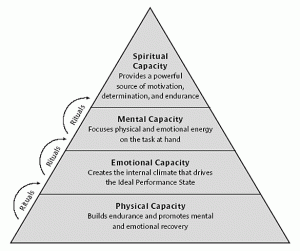What is the most important quality that companies seek in their employees?
According to the Harvard Business Review and their article “The making of a corporate athlete” written and posted by Jim Loehr and Tony Schwatz
High performance and being able to work under the pressure of many changes are some of the most sought out features, for a while only cognitive capacities were being looked for. After researching some theorists address that a successful approach to high performance is pulling together; Emotional, Spiritual and physical elements.
 The theory consists of managing the body, emotions, mind and spirit. This hierarchy is called The performance pyramid.
The theory consists of managing the body, emotions, mind and spirit. This hierarchy is called The performance pyramid.
Like mentioned in the article, when training athletes primary skills are never the main focus. When training in business “don’t address primary competencies such as public speaking, negotiating, or analyzing a balance sheet. Our efforts aim instead to help executives build their capacity for what might be called supportive or secondary competencies, among them endurance, strength, flexibility, self-control, and focus.” A condition where talents and skills reach their full potential and high performance is an important feature is called Ideal Performance State (IPS).
Summarizing several parts of the article, it mentions that life is tough and for many executives life only gets harder, many face everyday challenges with their personal and work life. Many don’t have the power to change external conditions but can only “Train” for these difficult conditions.
“The demands on executives to sustain high performance day in and day out, year in and year out, dwarf the challenges faced by any athlete we have ever trained. The average professional athlete, for example, spends most of his time practicing and only a small percentage—several hours a day, at most—actually competing. The typical executive, by contrast, devotes almost no time to training and must perform on demand ten, 12, 14 hours a day or more. Athletes enjoy several months of off-season, while most executives are fortunate to get three or four weeks of vacation a year. The career of the average professional athlete spans seven years; the average executive can expect to work 40 to 50 years.”
In The making of a corporate athlete they mention a hierarchy that is called The performance pyramid, this mentions different capacities that must be challenged and trained, they are;
Physical Capacity:
Training the physical level makes the body full of energy, which is the foundation of the pyramid. But when speaking of the body, not only should we train our workers to be healthier but also the mental and emotional, most executives create anxiety and stress.
The physical capacity builds endurance and promotes mental and emotional RECOVERY.
Emotional capacity:
Words like calm, challenged, engaged, focused and optimistic are used when an athlete has had a good game, or when their performance was at its ultimate best.
Jim and Tony later asked your everyday workers and they described the same feelings when doing an incredible job.
Their IPS was described as positive emotions that drive high performances, when negative emotions happen, that’s when frustration, fear, anger and energy drain happen.
Emotional capacity creates the internal climate that drives the ideal performance state.
Mental Capacity:
This capacity is usually the most trained when speaking of an executive, they tend to improve by learning about technologies or time management.
What is recommended is to simple focus on the task or goal given, but often meditate just quiet the mind and listen to your own thoughts.
Mental capacity focuses physical and emotional energy on the task at hand.
Spiritual Capacity:
“By spiritual capacity, we simply mean the energy that is unleashed by tapping into one’s deepest values and defining a strong sense of purpose. This capacity, we have found, serves as sustenance in the face of adversity and as a powerful source of motivation, focus, determination, and resilience.”
Provides a powerful source of motivation, determination, and endurance.
To conclude when looking around you, you can see that the world is changing at an incredible speed, now looking at the corporate world, you can see that there are changes made every single day. Companies can’t ignore their employees any more, they must train and acknowledge the wellbeing of their employees.
“When people feel strong and re-silent—physically, mentally, emotionally, and spiritually—they perform better, with more passion, for longer. They win, their families win, and the corporations that employ them win.”
